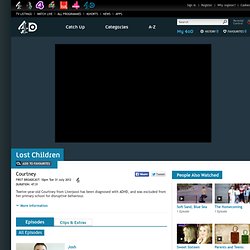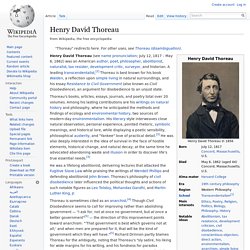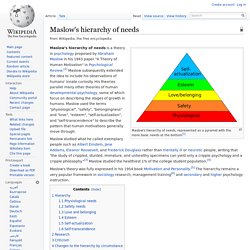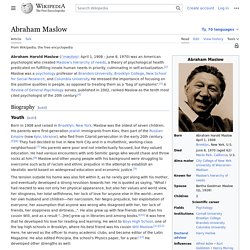

RSA Animate - Drive. Lost Children - 4oD. Twelve-year-old Courtney from Liverpool has been diagnosed with ADHD, and was excluded from her primary school for disruptive behaviour.

She's now starting her second year as a boarder at High Close School in Berkshire, which is run by Barnardo's and is home to some of Britain's most troubled children. According to Nikita, Courtney's key worker, she has tremendous potential. But as Courtney approaches her teenage years her behaviour is deteriorating fast. Struggling to find words for how she feels, Courtney says it's like there's 'a little cell in inside my head that says "don't care".
It's like my head's changed.' Behind Courtney's anger there's an extraordinary family story that stretches back more than four generations, from her mother, Sara, to her great-grandmother, Edna. Loving and close, these four generations are a remarkable testimony to the strength of their family ties but they're also players in a story of troubled and sometimes violent relationships. Holistic education. Holistic education is a philosophy of education based on the premise that each person finds identity, meaning, and purpose in life through connections to the community, to the natural world, and to humanitarian values such as compassion and peace.

Holistic education aims to call forth from people an intrinsic reverence for life and a passionate love of learning. This is the definition given by Ron Miller, founder of the journal Holistic Education Review (now entitled Encounter: Education for Meaning and Social Justice). The term holistic education is often used to refer to the more democratic and humanistic types of alternative education.
Robin Ann Martin (2003) describes this further by stating, “At its most general level, what distinguishes holistic education from other forms of education are its goals, its attention to experiential learning, and the significance that it places on relationships and primary human values within the learning environment.” Henry David Thoreau. Henry David Thoreau (see name pronunciation; July 12, 1817 – May 6, 1862) was an American author, poet, philosopher, abolitionist, naturalist, tax resister, development critic, surveyor, and historian.

A leading transcendentalist,[2] Thoreau is best known for his book Walden, a reflection upon simple living in natural surroundings, and his essay Resistance to Civil Government (also known as Civil Disobedience), an argument for disobedience to an unjust state. Thoreau's books, articles, essays, journals, and poetry total over 20 volumes. Among his lasting contributions are his writings on natural history and philosophy, where he anticipated the methods and findings of ecology and environmental history, two sources of modern-day environmentalism. Name pronunciation and physical appearance[edit] Maslow's hierarchy of needs. Maslow's hierarchy of needs, represented as a pyramid with the more basic needs at the bottom[1] Maslow's hierarchy of needs is a theory in psychology proposed by Abraham Maslow in his 1943 paper "A Theory of Human Motivation" in Psychological Review.[2] Maslow subsequently extended the idea to include his observations of humans' innate curiosity.

His theories parallel many other theories of human developmental psychology, some of which focus on describing the stages of growth in humans. Maslow used the terms "physiological", "safety", "belongingness" and "love", "esteem", "self-actualization", and "self-transcendence" to describe the pattern that human motivations generally move through. Maslow's theory was fully expressed in his 1954 book Motivation and Personality.[5] The hierarchy remains a very popular framework in sociology research, management training[6] and secondary and higher psychology instruction. Hierarchy Physiological needs Safety needs Safety and Security needs include: Abraham Maslow. American psychologist Abraham Harold Maslow (; April 1, 1908 – June 8, 1970) was an American psychologist who was best known for creating Maslow's hierarchy of needs, a theory of psychological health predicated on fulfilling innate human needs in priority, culminating in self-actualization.[2] Maslow was a psychology professor at Brandeis University, Brooklyn College, New School for Social Research, and Columbia University.

He stressed the importance of focusing on the positive qualities in people, as opposed to treating them as a "bag of symptoms".[3] A Review of General Psychology survey, published in 2002, ranked Maslow as the tenth most cited psychologist of the 20th century.[4] Biography[edit] Youth[edit] College and university[edit] Academic career[edit] He continued his research at Columbia University on similar themes. Death[edit] Maslow's contributions[edit] Humanistic psychology[edit] Most psychologists before him had been concerned with the abnormal and the ill.